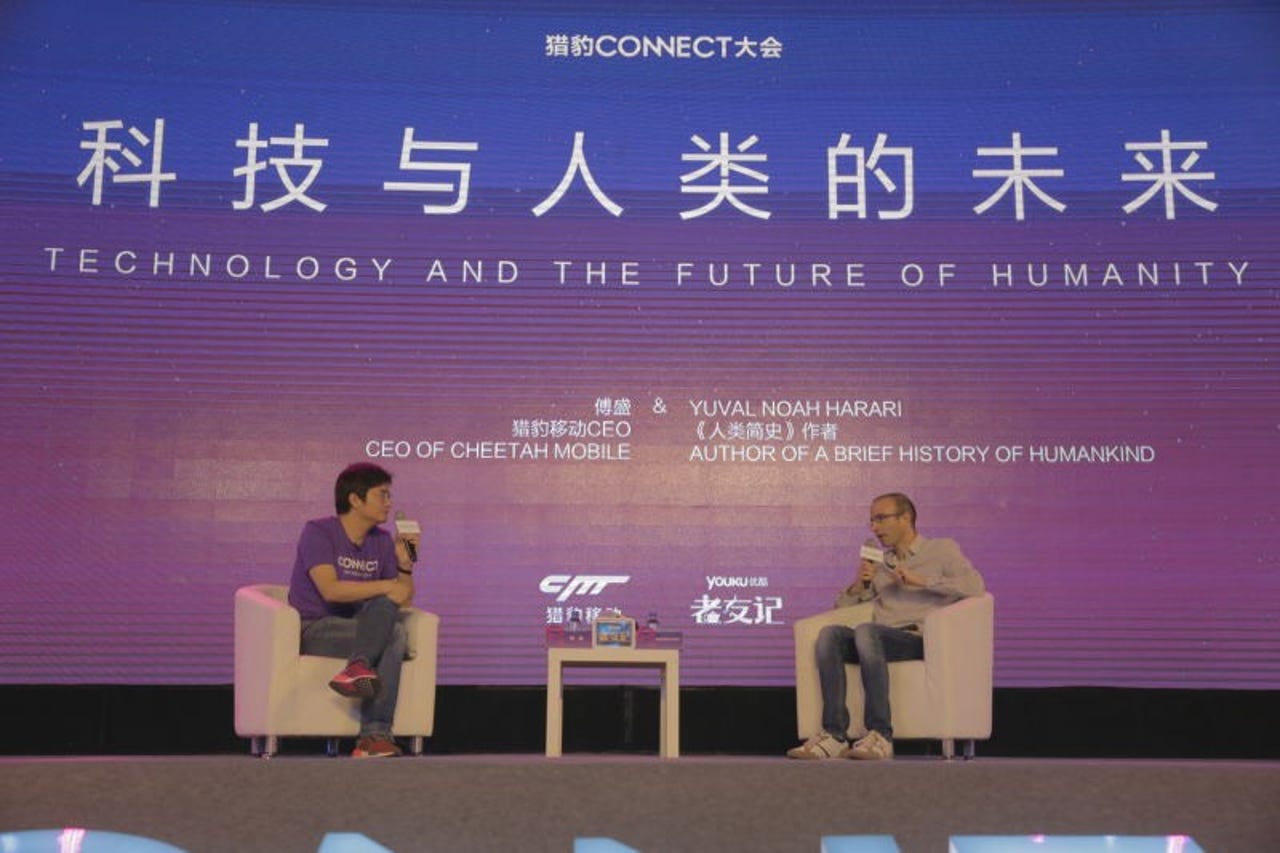With Cheetah Robotics launch, software giant wants to create China's first global tech brand


Cheetah Mobile CEO Sheng Fu interviews author Yuval Noah Harari at App Insight 2016 in Beijing.
When Cheetah Mobile CEO Sheng Fu went to the US for the first time five years ago, he asked himself, "Why is that Chinese companies work so hard but the most important inventions and new technologies come out of America?"
He concluded that the difference between China and the US is that Americans think bigger and dream bigger.
This week in Beijing, Fu announced his company is going to launch itself into AI and deep learning, create a dual headquarters in Beijing and Silicon Valley, and release robots for consumers on a global scale.
No one is going to accuse Fu of not thinking big enough.
He wants to turn a Chinese company that makes smartphone utilities and mobile games into a multinational powerhouse that builds some of the world's smartest consumer-facing robots to automate people's most mundane tasks.
More precisely, Cheetah Robotics will be a spin-off, an independent subsidiary of Cheetah Mobile. But the Cheetah Mobile team will be involved. That will include Charles Fan, the former VMware and EMC executive that Cheetah Mobile hired in February to be its new CTO and to run the company's new second headquarters in Mountain View, California.
For Fan, the leap from apps to robots makes perfect sense. He told ZDNet, "Cheetah Mobile is a leader in tools. And robotics is the ultimate tool."
But, the driving force behind Cheetah Robotics will be Fu himself. He surprised even some of his Cheetah Mobile employees when he revealed the Cheetah Robotics news to a group of international reporters at the company's Beijing headquarters, a day before the Cheetah's App Insight 2016 conference.
One of the employees said that Fu, a former software engineer, has been intensely studying AI and deep learning to prepare for the launch of Cheetah Robotics. Fan said that Fu will spend a good chunk of his time leading the new company and will split his time between Beijing and California to do it.
But, Fu told ZDNet that starting a robotics company allows Cheetah to play to China's strengths. If a global tech brand is going to come out of China, then robotics is a perfect candidate, he said, for three reasons:
- China has an abundant supply of hardware and software engineers to work on it.
- It has the manufacturing base. "China has the strongest factories in the world. You can produce anything," Fu said. "A new company can produce very good hardware products."
- The investment atmosphere in China is still strong for building next generation tech companies.
Fu said that Cheetah Robotics will make both the hardware and the software for its robots. He pointed to Xiaomi, which didn't know anything about hardware five years ago and is now China's leading handset maker, to support his assertion that having easy access to Shenzhen's nearby tech factories and hardware expertise will be a big advantage for Cheetah.
Cheetah Robotics' biggest challenge will likely be that the quality of the competition is heating up quickly. Google's parent company Alpha has been investing heavily in robotics, AI, and deep learning for the past several years. Japanese companies, of course, have been investing in robotics for decades. Honda has ASIMO and Softbank has Pepper (powered by IBM Watson), the two most similar products to what Cheetah wants to build. Both took many years of research and deep resources, and yet both remain highly limited in their functionality.
Still, it would be foolish to dismiss Fu and his team. In just six years, he's built one of China's largest tech companies by turning Cheetah Mobile into the world's third largest app developer after Google and Facebook--based on number of worldwide app installs. Titles like Clean Master and Piano Tiles 2 have become runaway hits with high ratings from consumers, awards for product design, and flawlessly executed marketing strategies.
Fu's Cheetah Mobile has also been a bit of an outlier among Chinese tech giants. While companies like Tencent (the Facebook of China) and DiDi (the Uber of China) have been content with focusing on China's massive market and spent few resources on international expansion, 78% of Cheetah Mobile's customers are from outside the Chinese mainland.
If any Chinese company is going to evolve into a global tech brand in the next decade, Cheetah Mobile has the biggest head start.
Cheetah also has the famous "vision thing" that American companies like to talk about--and that Fu picked up on when he came to the US for the first time and asked himself why American tech companies in Silicon Valley were the source of such a disproportionate amount of global innovation.
If you look at Beijing's Forbidden City or the Great Wall of China, or you think about explorers like Zheng He--who had a fleet 10 times the size of Columbus' and sailed to India and Africa 70 years earlier than Columbus went to America--it's clear that China has a legacy of visionary thinking. It's a place where scale and big ideas are embedded in the cultural DNA.
It's likely only a matter of time before a multinational tech giant rises from the country and takes its place among the tech industry pantheon. You could argue that Huawei and Baidu are already on their way there. While Cheetah Robotics is just starting its journey, that's the vision it already has in mind. And given that it's tackling one of the hottest issues of the century, it could be one of the most interesting to watch.